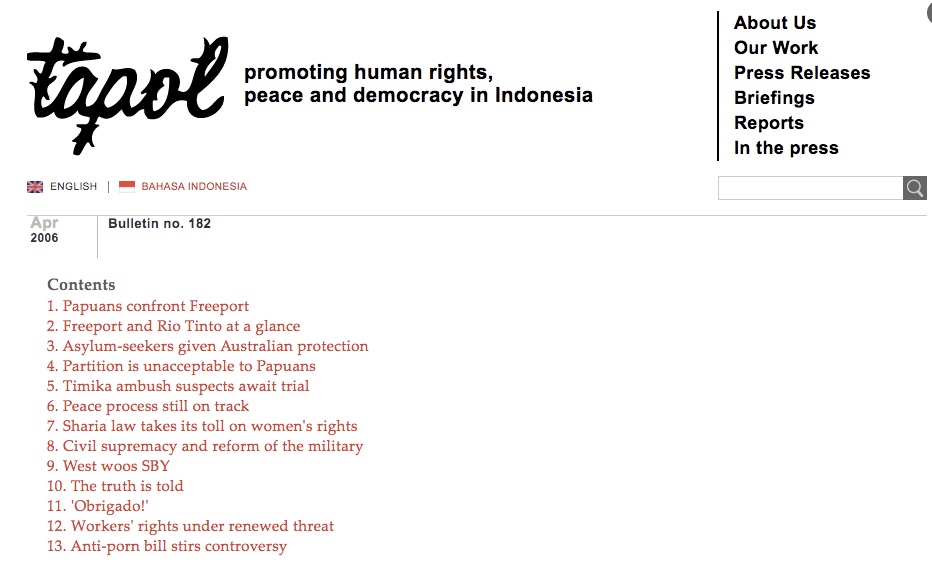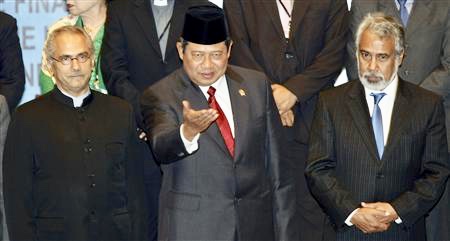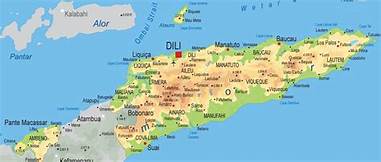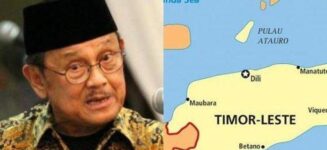
The article, titled ‘Obrigado!’ (thankyou in Tetum), was first published by Radio Netherlands and translated and published by Tapol on April 1, 2006. https://www.tapol.org/bulletin/182-april-2006#obrigado
Two heads of state recently agreed to forget a terrible past so as to be able to consolidate their friendship. Susilo Bambang Yudhoyono and Xanana Gusmao met in Bali to discuss a report recently submitted to the UN Secretary General about Indonesia.
Jakarta politicians and nationalists were furious about this while President SBY politely turned down a visit to Jakarta by Xanana. They thought Xanana was planning to forward a complaint against Indonesia to the UN. Fadli Zon, a close buddy of General Prabowo, complained: ‘Timor depended on Indonesia for everything but they have no sense of gratitude,’ he said. This reminds me of the time when the TimTim referendum was held in September 1999. Just imagine how amazed I was to hear someone on a Jakarta television programme say, following the announcement of the pro-independence results: ‘TimTim does not know how to say, thank you.’
Is it not a fact that during the days of Indonesia’s struggle for independence in the 1940s, the Dutch political elite also accused the Indonesians of being ungrateful? And last year, detik.com said that the Acehnese don’t know the meaning of ‘thank you’, that the expression does not exist in the Acehnese language.
But hold on! In Aceh, ‘thank you’ is used to give praise to God which is why both sides, those being thankful and those being thanked, use the expression ‘Alhamdulillah’. Both sides give thanks to God which means that there is no equivalent phrase in Acehnese. In former days, the Dutch also thought that Indonesians should be grateful. When Dutch men and women were released from Japanese prisons in the 1940s, they were shocked to discover that an independence struggle was underway and called the natives ‘ungrateful’.
Today the same thing is happening in Indonesia with regard to TimTim. Timor Leste which for such a long time was torn apart by colonial paternalism, should have been grateful to Portugal and the Church. ‘Obrigado’ (thank you) was the way they saw it. So now, centuries later, the people of Timor Leste are being reprimanded for not being grateful or in other words not seeing colonialism as a blessing. And moreover – no less important – the lack of an expression for ‘thank you’ does not mean that a nation does not have the capacity to feel grateful. To regard other nations as immoral is an abuse, a form of racism.
Neo-colonial oppression
These examples show how those in power and the reality of neo-colonial oppression can distort people’s perceptions of other people, as with the Indonesian press in the case of Timor Leste. It seems that neo-colonial sentiment has entered our mindset, the very way we think. The complexities of a former colonised nation have been replaced by the complexities of a former coloniser.
So, what has happened? Timor Leste, especially President Xanana and Foreign Minister Jose Ramos Horta, had no intention of cornering Indonesia by filing a complaint to the UN. It was the UN and the Timor Leste Parliament which instructed the Timor reconciliation commission to conduct a major investigation into the human rights abuses perpetrated by Indonesians and East Timorese from 1974 to 1999. The commission, known as CAVR, has now completed its report after interviewing eight thousand people; their investigations went on for three years.
For Indonesia it was a matter for regret, while President Xanana was angry because the CAVR report recommended that the Timor Leste government should call for an international tribunal and demand compensation for Timorese human rights victims. Whatever he may have felt, Xanana was required by law to present the report to the UN Secretary General.
We know very well that the Timorese people as well as their government, including President Xanana and Foreign Minister Ramos Horta, in their hearts of hearts, certainly want justice for the victims of one of the worst human rights disasters ever to have happened in Asia. But we also know that the Dili government realises that in today’s world, justice is for those who win wars. All international tribunals since Nuremberg, Tokyo and Rwanda, and the former Yugoslavia took place thanks to strong pressure from, and the agreement of, the super powers which had won these wars.
The TimTim dispute was settled at the negotiating table with no victors, but the majors powers who sit on the UN Security Council had no interest in there being a tribunal for Timor Leste. During the entire period of the Timor Leste conflict, from 1974 till 1999, real politik meant that Indonesia was more important than Timor Leste. If Timor Leste had called for a tribunal, it would have been strongly resisted by Indonesia.

Burying the past
Timor Leste’s position is quite understandable, yet even so, Jakarta politicians were infuriated, that when the two leaders met, they agreed to bury the past. The generals who were responsible for the 180,000 victims have escaped justice. The generals and war criminals of Serbia were less fortunate because their country is located in Europe and their civil war took place on the fringes of Europe. The Indonesian generals who escaped justice can consider themselves lucky because their country does not impinge on the interests of the superpowers. As the beneficiaries of impunity, Indonesian politicians and soldiers should say ‘Obrigado’ to Timor Leste…
Indonesia should understand the position it is now in, and should respect the dignity and sacrifices of a neighbouring country by acknowledging the facts contained in the CAVR report. As CAVR was set up by the UN, Indonesia and Timor Leste should call on the international community, and specifically on the UN, to set up an international tribunal or a hybrid tribunal as in Cambodia to deal with those responsible for human rights crimes in Timor Leste. It is up to the UN to make a move. Civil society in Europe, Indonesia and Timor Leste must now act.
To my readers, let me say: ‘Obrigado!’
This article was written by Abpoerijadi Santoso of Radio Netherlands



